Health, Pet Dogs, Taking care of pets
How to treat acute gastroenteritis in dogs
Why do dogs get acute gastritis? How to treat this disease in dogs? The following article Inkpawarts will discuss the causes and most effective treatments for gastroenteritis in dogs.

Causes of gastroenteritis in dogs
Acute gastritis in dogs occurs year-round and is more common in the summer when the weather is hot and humid. There are three possible causes of acute gastritis in dogs:
- Hookworms: Hookworms in dogs have sharp chitin hooks that penetrate the wall of the small intestine in the duodenum and jejunum to suck blood. They cause damage and bleeding in the intestinal mucosa. Bacteria present in the intestinal mucosa will invade the damaged areas, causing intestinal inflammation in dogs.
- Due to viruses: Parvo Virus, Care Virus. When entering the dog’s digestive system, it develops rapidly, destroying the lining of the stomach and intestines.
- Due to bacteria: Dogs eat and drink food and water containing bacteria. For example, typhoid bacteria (Salmonella), anaerobic bacteria (Clostridium), E.Coli… These bacteria will grow in the digestive tract mucosa, causing dogs to have acute gastritis and enteritis.
Symptoms of the disease
When dogs have gastritis, they often eat less, and in the first few days, they eat less or stop eating. Sometimes there are symptoms such as licking, not being able to swallow food, and nausea. Bad breath, and yawning. Sometimes the dog is constipated, with obvious abdominal pain. The front legs stretch forward, lying in cold, dark places. The abdomen will be painful when touched.
Fever 39.5 – 40°C with shivering. Then the dog vomited continuously and had severe diarrhea. The stool was initially constipated and then loose and gray-yellow. There was mucus in the stomach and intestines, with a very fishy smell.
Vomiting is one of the main symptoms when dogs have gastritis. When vomiting begins, it is gastric juice and mucus. Sometimes mixed with blood, bile, and mucosal debris. Due to vomiting, symptoms of dehydration appear, sunken eyes, and skin loses elasticity. Sunken eyes, sunken abdomen, wrinkled skin. When dehydrated, dogs will die after a few days if not treated promptly. In the final stages of the disease, dogs often have intestinal bleeding, so the stool is dark brown or lethargic like fish blood. Before death, the dog’s body temperature often drops. During this period, the dog cannot walk, is exhausted, lies in one place, and dies.
If your dog vomits food that is mixed with yellow or green, there are signs that they are vomiting bile. In such a situation, take them to the vet . It is difficult to diagnose gastritis by just looking at external factors. They may have problems with the pancreas and kidneys, or they may have stomach ulcers, intestinal bleeding,
How to treat the disease
Feed dogs cooked food, do not feed raw meat and raw eggs. Raw meat and raw eggs are easily contaminated with bacteria that cause gastritis and digestive problems in dogs. For example, typhoid bacteria, anaerobic bacilli, E.Coli bacilli. Do not feed dogs spoiled food, give them clean, uncontaminated water. Periodically deworm dogs with Vimectin every 3-4 months to avoid mechanical damage leading to acute enteritis. Keep the pet’s living space clean, clean, and airy. Keep pets warm in winter.
Refer to the treatment
- Diet: Stop feeding for 24 hours and limit water intake if you don’t want your dog to get gastritis. After 24 hours, feed your dog porridge. Make sure to divide it into many meals and feed it in small amounts.
- Eliminate the substances in the stomach: It is not necessary to prevent the dog from vomiting. Preventing the dog from vomiting is harmful because the stomach is distended. Vomiting can reduce the burden on the stomach. At the same time, push the harmful substances out. In the early stages of the disease, 3-5ml of Apomorphine Hydrochloride can be injected subcutaneously to push the harmful substances out. When necessary, give the dog 20-50ml of Paraffin oil or laxatives. They can quickly clean up the substances that cause gastritis in dogs.
- Anti-vomiting sedative: Let the dog rest, inject 1ml/kg of Chlorpromazine subcutaneously. Give 1-2 Metoclopramide tablets orally, twice a day. Can give the dog chamomile water, which has a sedative effect. If vomiting is severe, it can lead to dehydration and electrolyte loss. Can inject the dog with Sodium chloride compound or intravenously inject a 5% Glucose solution.
- Prevent stomach pain: To stimulate gastric juice secretion and reduce appetite, give the dog diluted salt water, 3 times a day, 0.2 – 1.0ml each time, Pepsin 0.1 – 0.5g, diluted Hydrochloric Acid, dissolved in water before feeding.
- Give your dog the medication Lactasin: to promote appetite.
Distinguishing between acute gastritis and gastric bleeding in dogs
Unlike dogs with acute gastroenteritis, dogs with gastric bleeding are caused by eating toxic moldy or wormy food. Or by mistakenly eating toxic substances that damage the intestinal mucosa, digestive system, and subcutaneous lip. Sometimes the owner feeds the dog inappropriate food. Suddenly changing the type of food makes the puppy unable to adapt. In the raw materials, ingredients contain foreign substances that irritate. Moreover, dogs with acute gastritis, intestinal obstruction, infectious diseases…
Therefore, choosing dog food products is very important. You should carefully check the ingredients on the product packaging to see if they are suitable for your dog. For sensitive dogs, it is best not to use food that contains too much grain. It can also cause serious allergies.
Symptom
Dogs with gastric bleeding will have a bad spirit, loss of appetite, and weakness. Often have no appetite. Later, diarrhea causes dehydration, leading to a craving for water. The mouth is foul-smelling and dry. The mouth is dark red, and there will be mucus when defecating. When suffering from colitis, diarrhea occurs, and the toilet has a foul odor, blood, mucus, or necrotic tissue.
More seriously, there may be anal dilation and loss of bowel control. When the condition worsens, poisoning and dehydration become more severe. Cold ears, nose, and limbs, conjunctival congestion, and sometimes jaundice. Some irritation, convulsions, or coma appear. And neurological symptoms, very quickly leading to death. When detecting any symptoms, take the puppy to the veterinarian immediately. Do not attempt first aid without a doctor’s instructions.
Diagnosis and treatment
Acute bleeding is diagnosed mainly by acute vomiting and black stools.
- Anti-inflammatory antiseptic: Gentamicin 10,000 units per kg body weight. Intramuscular injection twice daily, double if taken orally.
- Supplement detoxification water: Glucose solution 30ml per kg body weight, 5% Sodium Bicarbonate 2 ml per kg body weight, intravenous infusion
- Antiemetic: Metoclopramide, 1 – 2 mg per kg body weight, intramuscular injection twice daily.
- Stop bleeding: anti-hemorrhagic drugs, 15-20mg per kg body weight. Intramuscular injection twice daily. Or 0.2-0.3mg vitamin K3 per kg body weight, 1mg vitamin K1, intramuscular injection, twice daily.
What should I feed my dog with a stomach ache?
In fact, for dogs with stomach problems, the best way is to let them starve for a day. It is very effective for both large and small dogs. But after fasting for a day, you should feed them rice. At this time, the rice fed to dogs should have a combination of Protein and Carbohydrate.
Temporarily avoid giving them foods high in oil and meat. Foods such as boiled egg yolks, rice, dumplings, or dog food soaked in water to soften are all in this category.
Usually, intestinal diseases can cause diarrhea. This disease is quite dangerous, if using inappropriate foods can make the condition worse. Seriously affect the health of pets.
After gastric bleeding, there are a few issues to be aware of. Start eating liquid foods, porridge, lotus root powder is quite good. You can drink milk in appropriate amounts. Do not eat or drink foods that are too sour or sweet. These can cause acid to increase. You must eat small, frequent meals and eat warm foods. Foods that are too hot can cause vasodilation in the stomach lining. Not good for stopping bleeding.

